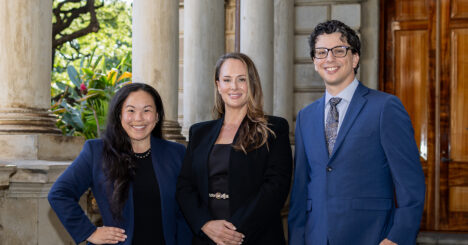By Rhonda L. Griswold and Summer G. Shelverton. Both Rhonda and Summer recently served on the drafting committee for Hawai‘i’s new Uniform Trust Code, and presented testimony to the legislature.
Effective January 1, 2022, Hawai‘i will join 34 other states and the District of Columbia in adopting the Uniform Trust Code (“UTC”). The UTC is a codification of the law of trusts, bringing together common law principles, restatement of law concepts, and various pre-existing statutes governing trusts under one statutory umbrella.
The UTC is primarily a default statute, which means that the terms of the trust document will continue to control the administration of the trust. While there are certain duties and powers that cannot be changed by the trust document (such as the trustee’s duty of good faith and the trustee’s duty to account), the meaning and distribution of the trust is governed by the trust instrument. However, where the trust is silent or fails to address an issue sufficiently, the UTC can provide guidance and procedures on how the trust is to be administered.
The UTC also fills in gaps where prior law was non-existent or unclear. For example, there is now a clear statute of limitations for persons to challenge the validity of a trust and/or to bring claims against a trustee. With respect to proceedings to contest a trust, the proceeding must be commenced within five years of the settlor’s death or 90 days after the trustee has sent the person a copy of the trust document and notice of the trustee’s name and address and the time period for contesting the document, whichever time period expires first. This time limit is the same as the statute of limitations for will contests, which makes sense given that revocable trusts serve as will substitutes. And it will make it easier for trustees who are concerned about challenges to the trust to proceed with the trust administration if they have given notice of the 90-day deadline to potential challengers.
Similarly, the UTC provides clearer statutes of limitations for beneficiaries to bring claims against a trustee. If the trustee provides a report to the beneficiary that adequately discloses the facts giving rise to the potential claim, then the beneficiary must file the breach of trust claim within one year or the claim is barred. If no such report is provided, then the beneficiary has three years from either the resignation of the trustee, the termination of the beneficiary’s interest, or the termination of the trust itself, whichever occurs first, to bring the claim. Of course, instead of relying on statutes of limitations, the safest route for a resigning trustee or trustee distributing assets at trust termination is to obtain formal approvals from the beneficiaries and/or the Probate Court.
The UTC also provides new opportunities to modify or even terminate trusts that have served their purpose or otherwise no longer make sense. If the settlor establishes an irrevocable trust and thereafter is still living, then the trust can be modified or terminated with the consent of the settlor and all of the beneficiaries even if such termination or modification completely defeats the original purpose of the trust. However, this option only applies to irrevocable trusts established after the effective date of the UTC (January 1, 2022). If the settlor is not alive and all the beneficiaries agree, then the Probate Court can modify or terminate the trust if the Court concludes that the modification or termination is not inconsistent with a material purpose of the trust even if the trust was established before the effective date of the statute. This mechanism could be used, for example, if the trust were originally established for tax purposes but the tax laws then changed to such an extent that the trust was no longer necessary. That said, there may be other reasons that such a trust still makes sense, such as providing protection against creditors or keeping the assets in the family. The UTC also allows for court-approved modifications or termination because of circumstances not anticipated by the settlor or if the continuation of the trust becomes impracticable.
This is just a small sampling of the UTC provisions. The UTC covers a vast range of trust issues, including the establishment of the trust relationship, trustee conflict-of-interest and succession issues, the trustee’s duty to account during the settlor’s lifetime and thereafter, trustee’s duties and powers, and holding trustees accountable to trust beneficiaries. While the UTC gives deference to the settlor and the settlor’s intent as expressed in the trust document, we expect that the UTC will help beneficiaries, trustees, attorneys, and the Probate Court navigate the variety of issues that can arise in the context of trust administration.
This article was published as part of the Fall/Winter 2021 issue of ke kumu, Cades Schutte’s client newsletter. Read the full publication, which explores some of the laws unique to Hawai‘i.





